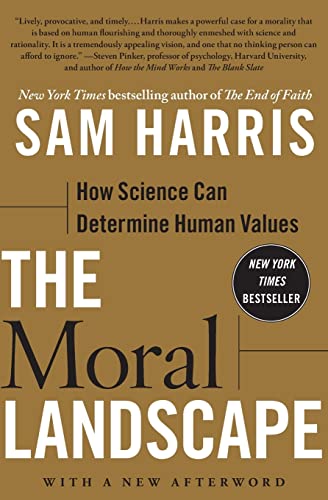The Moral Landscape
How Science Can Determine Human Values
Sam Harris
BOOK REVIEW

In a world teetering on the brink of moral confusion, Sam Harris's The Moral Landscape: How Science Can Determine Human Values emerges as a profound challenge to our preconceived notions of ethics and morality. With the boldness of a philosopher wielding a scalpel, Harris dissects the fabric of human values, insisting that science-not religion or cultural mores-should dictate our moral compass. This provocative work is an urgent call to reevaluate the foundations of our beliefs as we grapple with the complexities of human well-being in a rapidly changing global landscape.
What strikes you upon diving into this book is Harris's unyielding conviction that morality is not a matter of personal or cultural preference; it can be empirically understood and guided by scientific inquiry. This isn't just heavy jargon tossed around for effect-Harris lays out a captivating argument steeped in logic, reason, and observable facts. Imagine a universe where objective moral truths exist, and science holds the keys to unlocking them. This isn't mere fantasy; it's the foundation upon which The Moral Landscape is built.
Harris's exploration of morality extends beyond abstract concepts. He anchors his arguments in real-world implications, challenging readers to confront the harsh realities of suffering. You might find yourself reflecting deeply on the implications of his assertions as he emphasizes that moral questions should focus on the consequences of our actions-what promotes human flourishing and what diminishes it. This philosophical stance pushes us beyond traditional doctrines into the realm of evidence-based ethics, forcing us to confront our own beliefs with an unflinching gaze.
Critics may argue that Harris's stance falters under the weight of cultural relativism, claiming that his approach is too reductionist, stripping away the rich tapestry of human experience that shapes moral judgments. However, supporters rally to his side, lauding his courage to confront difficult questions that many would prefer to sidestep. In a climate where moral ambiguity reigns and relativism becomes an easy out, Harris's unapologetic call for a scientific understanding of ethics is like a lighthouse beaming through fog.
His discussion isn't merely theoretical; it resonates with a contemporary urgency reflected in debates about climate change, poverty, and healthcare. By advocating for a system of morality informed by the well-being of conscious creatures, Harris provides a framework to navigate these pressing issues. As you read, you'll feel the weight of this responsibility-each moral decision you face is amplified by the interconnectedness of society. Harris compels you to internalize this reality, making you acutely aware of the ripple effect your values and actions can have on the world.
What resonates powerfully is the author's ability to engage with potential objections while maintaining his ground-a feat rarely achieved in philosophical discourse. Harris respects the intelligence of his readers, inviting them to ponder rather than dismiss his arguments. From the firing line of atheistic rhetoric to the softer tones of understanding, the journey through this book is about grappling with our enduring human dilemmas and seeking pathways to greater enlightenment.
As you progress through the pages, prepare to experience an intellectual metamorphosis. Harris's relentless clarity challenges you at every corner, shaking the cobwebs clinging to your notions of right and wrong. You'll find moments where his words ignite a flame of righteous anger and compassion, begging you to reconsider not only your own moral frameworks but also the implications of those frameworks for others.
In the grander scheme, The Moral Landscape isn't merely a book about ethics; it's a manifesto for humanity's potential. It urges each of us to rise above outdated dogmas and embrace a new paradigm of understanding, guiding us toward a future where science and morality intertwine seamlessly. As the discourse around moral absolutism versus relativism intensifies, Harris's influential work reverberates across forums, lectures, and discussions, inspiring a generation to rethink what it means to be truly moral.
In the end, reading this book isn't just about absorbing knowledge; it's about joining a movement-a moral awakening that calls you to action. You are left with a primal urge to delve deeper, to question louder, and to ensure that your values are not just inherited but thoroughly examined and thoughtfully refined. The landscape of morality is shifting, and with The Moral Landscape, Sam Harris offers not just a map, but a call for all of us to become cartographers of a more compassionate world.
📖 The Moral Landscape: How Science Can Determine Human Values
✍ by Sam Harris
🧾 320 pages
2011
#moral #landscape #science #determine #human #values #harris #SamHarris